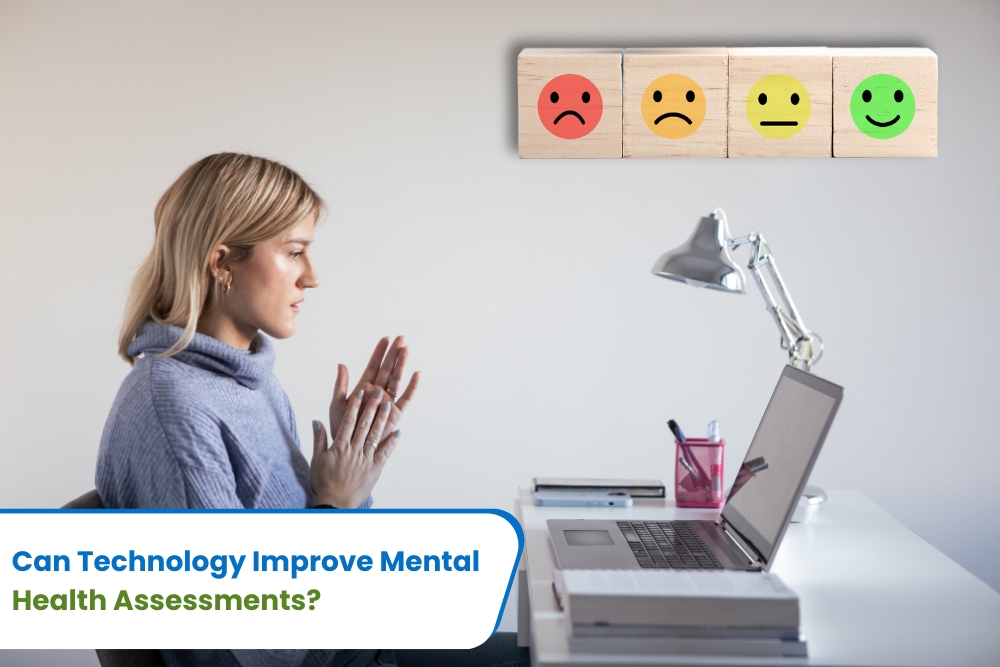Levelling up your mental health is as important as hitting the gym or sleeping for eight hours. But finding a good therapist can feel like finding a decent park downtown – expensive, packed, and not precisely in your ‘hood. Thankfully, there’s a new player on the mental health scene: technology. Thankfully, there’s a new player on the mental health scene: technology. Talking apps, online platforms, and even fancy AI could change how you approach mental health assessments. But before you ditch the therapist couch for a virtual reality headset, let’s see if these digital tools can truly measure up.
What are the limitations of traditional mental health assessments?
Everyone knows the drill: you sit across from a therapist, answer many questions, and hope they get a good read on you. While these traditional assessments have their place, they’re not perfect:
- Playing doctor: It’s easy to fake it ’til you make it, right? You might downplay how rough things are or forget stuff altogether. Plus, memories can be tricky – you might forget something important or just not want to discuss it.
- One-shot deal: A single chat might only catch some things, especially if your mood swings are wilder than the weather. Imagine spilling your guts just to have things change completely a week later!
- Location: Finding a therapist who’s a good fit and lives nearby can be a total quest. Forget the outback; even in cities, it can be tricky!
- The whole picture matters: Those question sheets and interviews can be helpful, but they might need to include some essential stuff. They focus on symptoms, but what’s going on underneath? Plus, everyone experiences mental health differently depending on their background.
- Snap judgments (not the fun kind): One meeting only tells part of the story, especially if you’re dealing with something that comes and goes. You might be feeling awful on assessment day, but that doesn’t mean that’s how you always are.
How can technology enhance mental health assessments?
Technology is stepping up to address these limitations and make mental health assessments a breeze:
- AI knows (almost) everything: Fancy computer programs, like mini-psych assistants, can analyse your voice, face, and even how you type. They can pick up on clues you might miss, like hidden signs of stress, like having a super-powered friend who can read your mind (but not in a creepy way).
- Virtual worlds: Imagine facing your fear of spiders from the safety of your living room! Virtual Reality can create controlled environments where you confront your anxieties. Pretty cool. This lets therapists see your fears up close and personal, helping them assess the situation better.
- Appy days: Apps can track progress in therapy sessions by monitoring your moods over time, giving therapists a better picture than just one chat. Think of it as a mood diary on steroids, showing them your emotional rollercoaster ride. This allows therapists to identify patterns and adjust treatment plans accordingly.
Are there any concerns about using technology in mental health assessments?
So, tech seems fantastic for mental health check-ups. Well, there are a few things to consider before you all go downloading therapy apps:

- Is it legit?: Those fancy AI programs are still learning the ropes. They might be wise, but are they accurate? You must ensure this tech works before relying on it for serious stuff.
- Privacy matters: Imagine someone peeking over your shoulder while you vent to your therapist. Not cool! The same goes for tech. You have to ensure all the information you share during assessments stays private and secure, just like with a real human therapist.
- Human touch matters: There’s something special about talking to a natural person who gets you. Tech can’t replace that human connection. While it can be a helpful tool, therapists, with their warm fuzzies and good listening skills, are still irreplaceable.
Does technology replace the need for human therapists?
Not a chance! Here’s how tech can make therapists even more astonishing:
- More time for you: Tech can handle the tedious paperwork, allowing therapists to focus on what they do best – talking to you!
- Double-checking: AI can be a second pair of eyes, flagging potential issues a therapist might miss during an assessment.
- Help from anywhere: Tech lets therapists offer help remotely via video calls, significantly increasing mental health access for everyone.
How can technology increase access to counselling services?
Mental health shouldn’t cost an arm and a leg! Here’s how tech can make getting help easier than ever:

- Budget-Friendly: Forget breaking the bank! Tech tools like online therapy platforms and mental health apps can be significantly cheaper than traditional in-person therapy. Depending on your needs, you can find options with subscription models or even free resources. This makes getting help a more realistic possibility for many people who might not be able to afford traditional therapy.
- Comfy Counselling: Ditch the waitlist and forget the commute! Online therapy lets you chat with a therapist from the comfort of your couch. PJs all day? You got it. Lunch break therapy session? Done! It’s all about convenience that fits your busy life.
- Breaking the Stigma: Feeling freaked out about talking to a stranger about your mental health? Same, been there. Online tools can be anonymous, which is a lifesaver if the thought of spilling your guts to someone new makes you sweat. It’s a cool way to dip your toes into therapy without any pressure and prioritise your mental health like a boss.
The takeaway
Technology is like a bright light in the world of mental health assessments. By harnessing technology to improve mental health assessments, these tools can overcome limitations and make things more accessible, empowering more people to get the help they deserve.
Let’s talk at Auburn Health Centre
At Auburn Health Centre, everyone deserves access to quality mental healthcare. We’re excited about how technology can help us improve our services and reach a wider community.
Suppose you’re curious about mental health assessments or want to know more about our current counselling services! Mental health services at Auburn Health Centre are here to provide the support you need. We’re here for you on your mental health journey.


